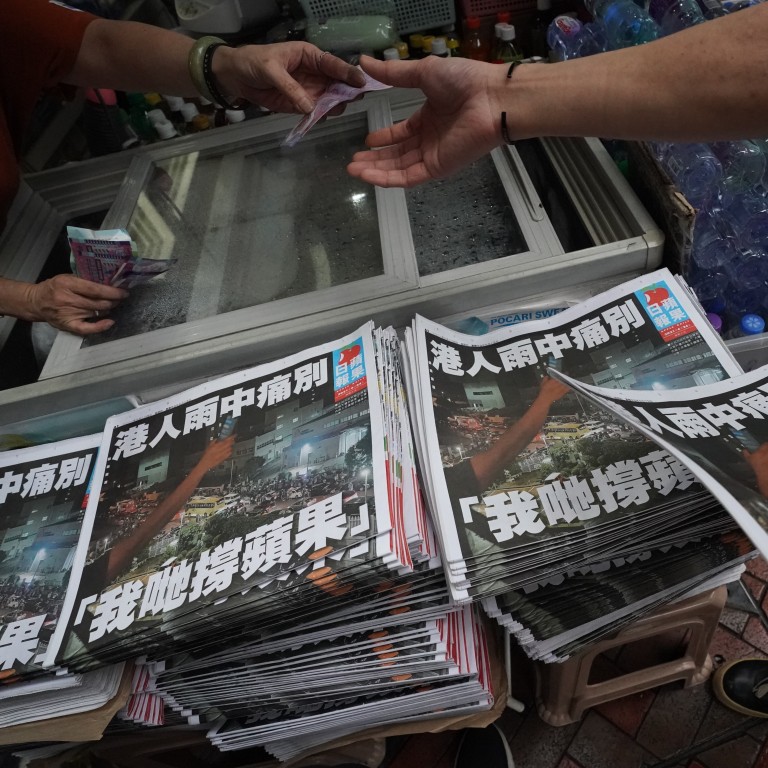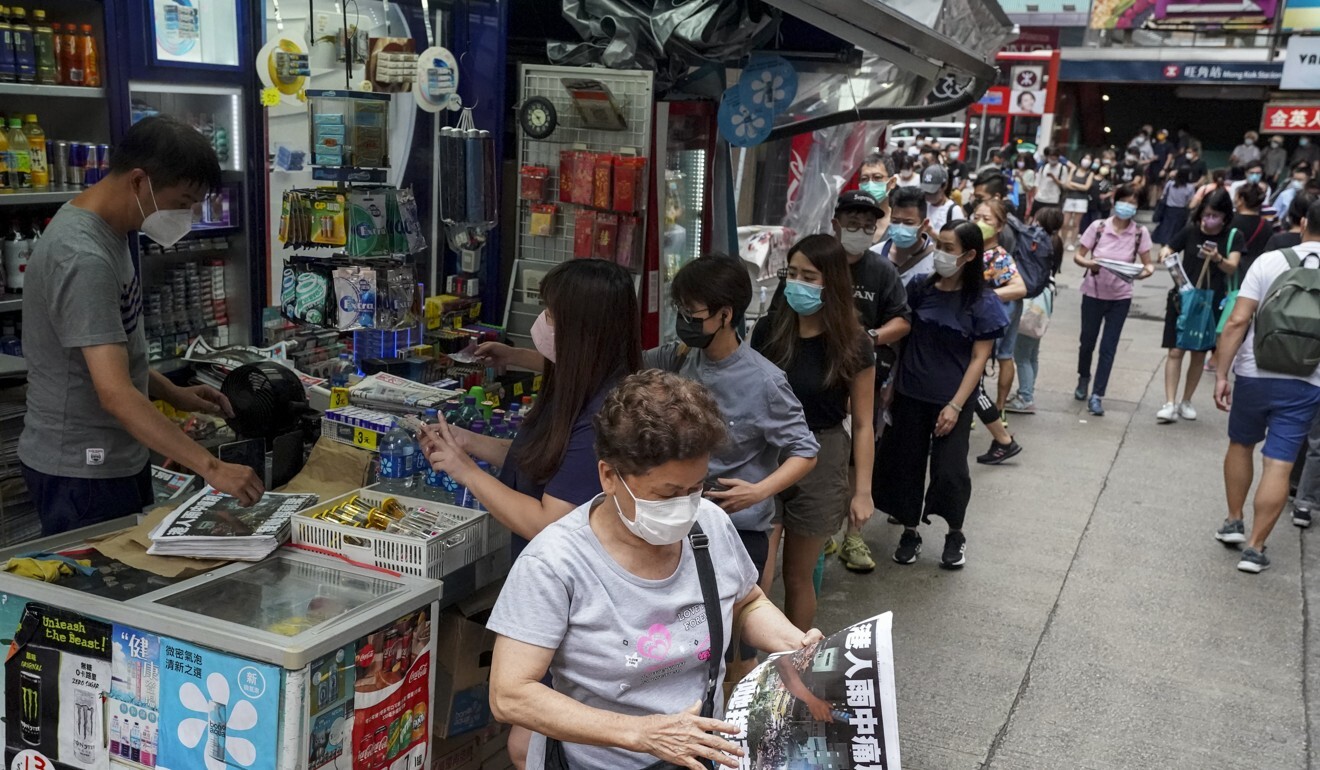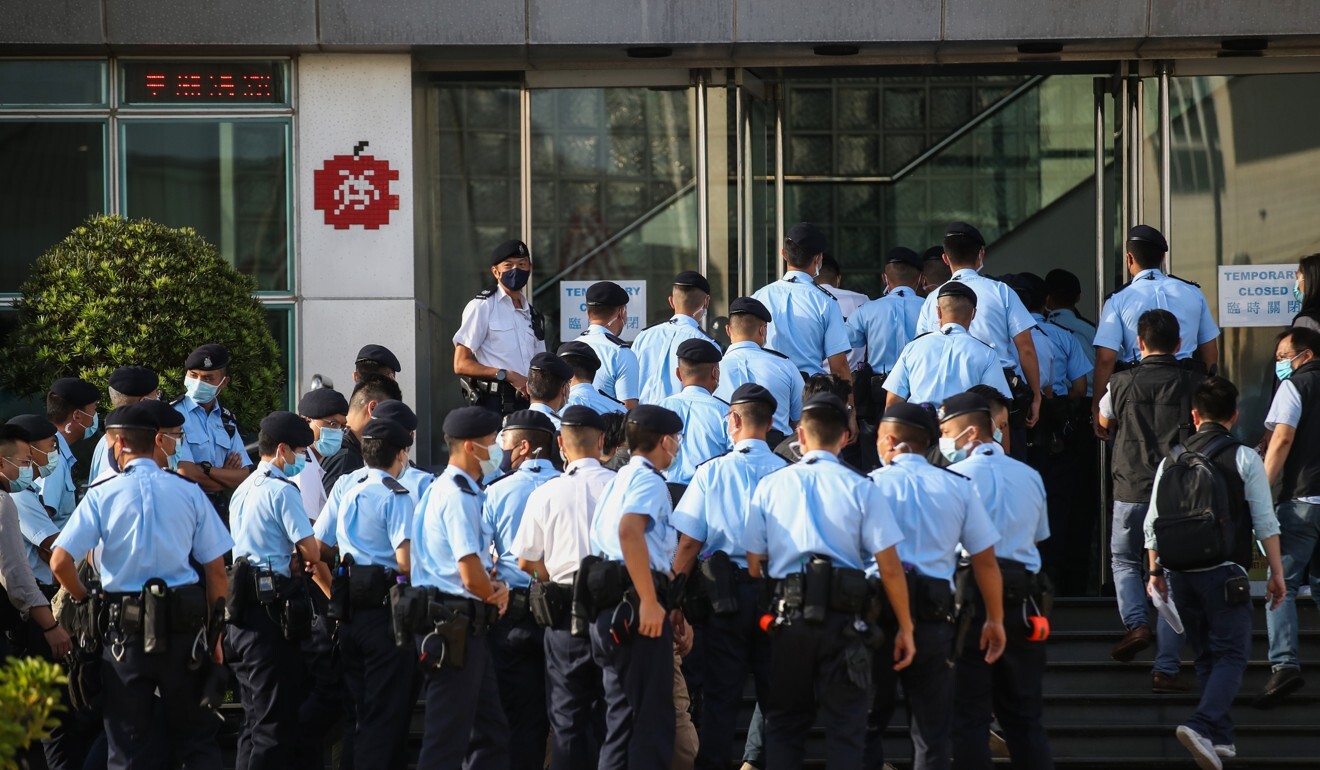
Apple Daily ends 26-year run in Hong Kong amid national security law crackdown as fans race to archive stories online
- Parent company Next Digital says 1 million copies of final edition were printed, but some readers complain they still could not get one
- Employees now out of work contemplate whether to remain in the business while efforts by supporters to archive millions of articles online spark legal questions
Hong Kong residents flocked on Thursday to buy a copy of the farewell edition of Apple Daily, as fans raced to archive its digital content and hundreds of employees rued their chances of getting paid by the now-defunct paper and finding work again.
Two senior executives who were among five arrested during a police raid last week challenged on Wednesday the seizure of news articles.
Authorities froze the company’s accounts and assets worth HK$18 million (US$2.32 million), which left management of parent company Next Digital struggling to continue operations. Police have cited the publication of articles allegedly calling for foreign sanctions, an offence under the national security law.
Foreign governments, including London, Washington and Tokyo, and human rights groups have expressed concerns the security law is being used to crack down on the press.
What’s next for Next Digital, with the closure of its flagship Apple Daily newspaper?
Chinese foreign ministry spokesman Zhao Lijian hit back at those claims on Thursday, accusing the Japanese and British governments of meddling in the internal affairs of the nation and Hong Kong.
“The British government is trying to use Hong Kong as a pawn to exert pressure on China. This approach is doomed to fail,” Zhao warned.
Beijing’s foreign ministry office in Hong Kong also accused “a small number of American and Western politicians” of using press freedom as a pretext to continuously attack the security law and smear the Beijing and Hong Kong governments.

British foreign secretary Dominic Raab said earlier the closure of Apple Daily was evidence the security law was “being used as a tool to curtail freedoms and punish dissent – rather than keep public order”. The American State Department said the United States was deeply concerned by “selective” and “politically motivated” use of the legislation.
Washington-based NGO the Hong Kong Democracy Council said authorities in Hong Kong and Beijing were “desperate to put an end to [Apple Daily]”, adding that “truth and truth-tellers have always been the Achilles’ heel of authoritarian regimes”.
In anticipation of high public demand, Next Digital said it printed a million copies of its final edition, compared with its usual 80,000, but many residents still complained they were unable to secure one.
It’s a pity and hard to let it go
At one news-stand in Mong Kok, queues started to form the night before and by the time the edition arrived at around 1am, the line stretched for hundreds of metres, wrapping around several street corners.
Charmaine Chan, who is in her 20s and works in culture, was among the first in line and wanted to buy 40 copies for friends, but could only get three due a quota imposed by the vendor.
“It’s a pity and hard to let it go,” she said. “Today Apple Daily vanished and we don’t know who the next one will be.”
The operator of another news-stand in the area said she had ordered up to 10,000 copies and had sold more than 1,000 by 8am.
Under a headline reading: “Hongkongers reluctantly bid farewell under the rain: ‘We support Apple Daily’,” the newspaper said it had fought “the good fight”.

02:32
Apple Daily editor-in-chief, 4 newspaper directors arrested under Hong Kong national security law
“Even though there are regrets, we are thankful about having stood steadfast with Hongkongers until the end,” the report said.
Another reader, 48, bought five copies at one news-stand and returned later to buy another five. He said he believed “the voice that represents Hong Kong has disappeared”.
“It is a day worth remembering,” he said.
Next Digital employed about 800 people, according to recent Apple Daily reports. One journalist, who preferred to remain anonymous, said many colleagues who had quit earlier this year had switched to public relations, while others wanted to take a break and a few had chosen to remain in the industry.
Hong Kong academics quit op-ed columns, cite national security law
“It was very touching, but I guess it is too early to get a job. After all, it was just one day after we rushed for the publication of the paper’s final edition.”
Faced with the approaching end of the 26-year-old newspaper, discussions in online forums turned to ways to archive its millions of articles.

Hours after Apple Daily folded at midnight and closed its websites and social media accounts, the Post found four digital archives had emerged, with users continuing to upload content.
But it remained unclear whether sharing articles calling for sanctions constituted an offence under the security law.
Clement So York-kee, a journalism scholar at Chinese University, said the reporting by Apple Daily had improved in recent years and attracted many readers with its unique brand of “advocacy journalism”.
“Whether that [type of journalism] can succeed depends on the societal situation, whether there are controversies [to report on],” So said. “If that’s the case, some media outlets will put more of their own views into the reporting as a form of advocacy journalism.”
Liu Sair-ching, chairman of the Coalition of Hong Kong Newspaper and Magazine Merchants, said he believed Apple Daily readers would not switch to other papers after its closure, meaning news-stand owners would take a hit.
Additional reporting by Sammy Heung, Mimosa Ngai, and Chan Ho-him


